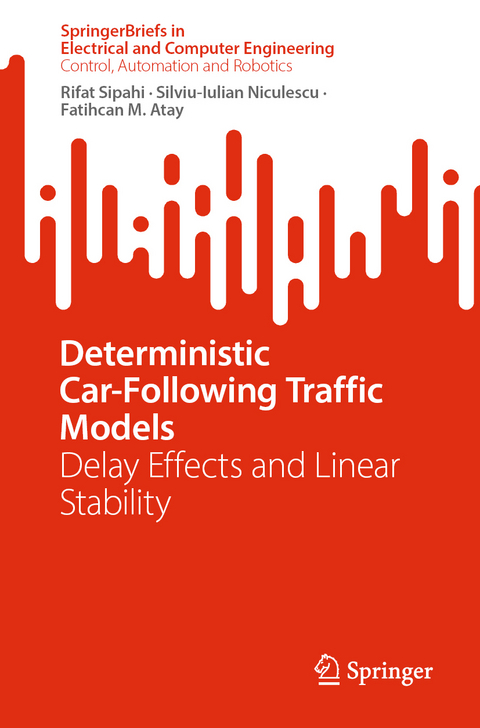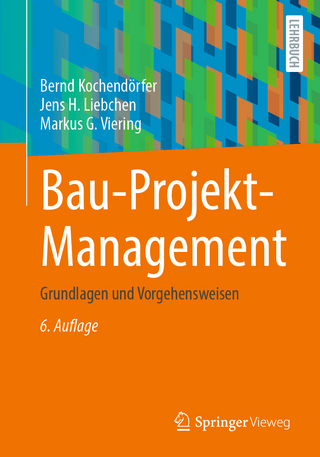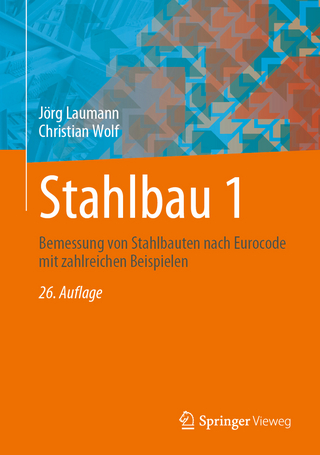
Deterministic Car-Following Traffic Models
Springer International Publishing (Verlag)
978-3-031-58163-2 (ISBN)
This book is a study of the effects of delays, stemming from a range of sources, on the behaviour of traffic flow. It provides the reader with theoretical approaches and computational tools, including existing tools from the field of control systems, for analysing the stability and slinky features of dynamical systems affected by time delays. Through examples and case-studies it shows how to implement these tools on a variety of traffic-flow models.
The models considered are microscopic flow models (dealing with the behaviour of individual vehicles rather than the study of group effects) formulated as continuous-time deterministic delay-differential equations. Physiological lag (human reaction), mechanical time-lag and the delay time of vehicular motion are only a few examples of the multitude of delays that are applied to a traffic model. Such delays may also be discrete (constant), distributed or time-varying; the text concentrates on the constant and distributed delays associated with the representation of linear stability and slinky features to allow a compact and analytically tractable demonstration of the intricacy of delay effects.
Readers with an academic research background in applied maths, vehicle dynamics and traffic modelling and graduate students working in those fields will find this brief to be an interesting source of results and openings for further work. It is also useful for engineers working on traffic-management systems and the guidance and control of autonomous vehicles.
Rifat Sipahi received the B.Sc. degree (2000) from Istanbul Technical University, Istanbul, Turkey, and the M.Sc. (2002) and Ph.D. (2005) degrees from the University of Connecticut, Storrs, CT, all in mechanical engineering. Awarded with a Chateaubriand Postdoctoral Scholarship of the French Government, he has been a postdoctoral fellow at HeuDiaSyC (CNRS) Labs at Universit'e de Technologie de Compi`egne, France, during 2005-2006. In 2006, he joined the Department of Mechanical and Industrial Engineering, Northeastern University, Boston, where he is currently a Professor. His research interests include stability, stabilization of dynamical systems at the interplay between multiple time delays and network graphs, human-machine systems and human-robotic interactions. He is the recipient of the 2015 ASME Dynamic Systems and Control Division Outstanding Young Investigator Award, a 2011 DARPA Young Faculty Award, 2022 College of Engineering Outstanding Faculty Service Award, and 2014 College of Engineering Faculty Fellow Award. Among his involvement at various capacities in ASME, IEEE and IFAC sponsored conferences/workshop, he was the co-chair and Editor of 2022 IFAC Workshop on Time Delay Systems. Dr. Sipahi is currently an Associate Editor for Automatica. He is a Fellow of ASME and a Senior Member of IEEE.
Silviu-Iulian Niculescu received his Ph.D. from INP Grenoble, France in 1996. From 1992 to 1997, he was with the Department of Automatic Control and Computers, University "Politehnica" Bucharest, Romania. From 1997 to 2006, he was with the HEUDIASYC laboratory, Compiègne, France, as a researcher at CNRS. He also held a postdoctoral position in the Department of Applied Mathematics, ENSTA, Paris, France, from 1996 to 1997. In September 2006, he joined L2S, Gif-sur-Yvette, where he is currently a research director (senior researcher) at CNRS. He was the head of the laboratory for a decade (2010-2019). Dr. Niculescu was awarded the CNRS Silver and Bronze Medals for scientific research, and the Ph.D. Thesis Award from INPG, Grenoble (France) in 2011, 2001, and 1996, respectively. His research interests include delay systems, robust control, operator theory, and numerical methods in optimization and their applications to the design of engineering systems.
Fatihcan M. Atay received his Ph.D. in Applied Mathematics in 1994 from Brown University, USA. He held positions in both academia and industry before joining the Max Planck Institute for Mathematics in the Sciences, Leipzig, Germany, where he worked as Principal Investigator and the Coordinator of the research group "Dynamical Systems and Network Analysis" between 2002 and 2016. He is now Professor of Mathematics and Head of the Mathematics Department at Bilkent University, Turkey. Fatihcan Atay is the author or co-author of over 100 peer-reviewed publications and the editor of a volume on complex time-delay systems. He is on the editorial board of the Springer book series "Advances in Delays and Dynamics". He has organized several international workshops, and in 2012-2015 he coordinated an international consortium of several universities in the context of a large European project. His expertise and research interests are in the areas of dynamical systems, delay-differential equations, complex systems and networks.
On Traffic Modeling.- Delays in Traffic-Flow Models.- Stability Analysis Framework of Delay Systems.- Linear Stability of Traffic Flow Models with Discrete Delays.- Linear Stability of Traffic-Flow Models with Distributed Delays.- Slinky Effects with Discrete and Distributed Delays.- Conclusions and Future Directions.
| Erscheinungsdatum | 09.11.2024 |
|---|---|
| Reihe/Serie | SpringerBriefs in Control, Automation and Robotics | SpringerBriefs in Electrical and Computer Engineering |
| Zusatzinfo | XV, 113 p. 28 illus., 1 illus. in color. |
| Verlagsort | Cham |
| Sprache | englisch |
| Maße | 155 x 235 mm |
| Themenwelt | Technik ► Bauwesen |
| Technik ► Elektrotechnik / Energietechnik | |
| Schlagworte | Car-following Systems • Human Reaction Time • Slinky Effects • stability of dynamical systems • Time-delay Systems • Traffic Flow |
| ISBN-10 | 3-031-58163-6 / 3031581636 |
| ISBN-13 | 978-3-031-58163-2 / 9783031581632 |
| Zustand | Neuware |
| Haben Sie eine Frage zum Produkt? |
aus dem Bereich


